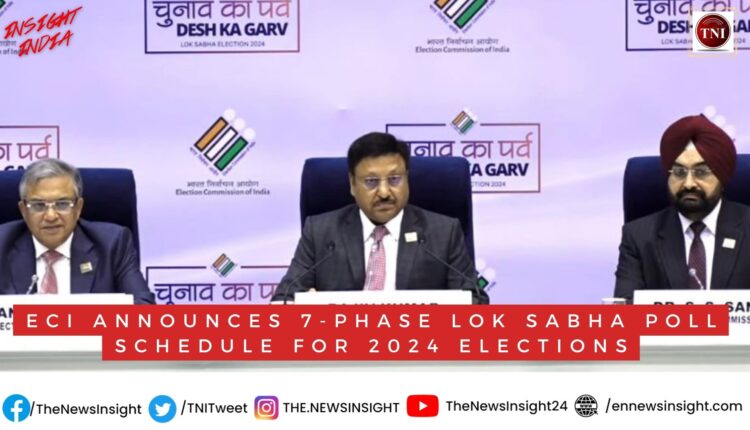New Delhi: The Election Commission of India has revealed the dates for the upcoming Lok Sabha Elections slated to take place in April-May this year.
As per the Election Commission’s announcement, the general elections for 543 constituencies will be conducted in seven phases, the first phase for 102 constituency voting taking place on April 19, second phase for 89 constituency taking place on 26 April, third phase for 94 constituency taking place on on May 7, fourth phase would go to poll on 13 May for the 96 constituency would go to poll on May 20 49 constituencies, while the sixth phase will go to poll on 25 May for 57 constituencies, and the last phase of the elections would go to poll on June 1 for 57 constituencies.
Simultaneously, the assembly elections for Sikkim’s 32 constituencies and Arunachal Pradesh’s 60 constituencies will take place on April 19. In Odisha, polling for the fourth phase will occur on May 13 for 42 constituencies, followed by the fifth phase on May 20 for another 42 constituencies, and the sixth phase on May 25 for the remaining 42 constituencies, with the seventh phase scheduled for June 1.
Andhra Pradesh will go to the polls on May 13 for 175 constituencies.
The Commission disclosed these details during a press conference held in the national capital on Saturday afternoon.
Subsequent to the election dates unveiling, the Model Code of Conduct has been enforced nationwide.
Support Independent Journalism? Keep us live.
Chief Election Commissioner, Rajiv Kumar, stated, “The term of the Lok Sabha is due on 16th June 2024, and simultaneously, the terms of Andhra Pradesh, Odisha, Arunachal Pradesh, and Sikkim expire in June 2024, with elections for the Jammu and Kashmir assembly also impending.”
The CEC further emphasized that there are a total of 96.5 crore electors, comprising 49.7 crore males and 47.1 crore female voters. Additionally, approximately 1.8 crore voters fall within the age group of 18-19 years, while 19.74 crore voters are aged between 20-29 years.
Additionally, there has been a significant growth in the number of women participating in the elections. The Chief Election Commissioner Rajeev Kumar also addressed concerns about misinformation on social media platforms, issuing a firm warning to political parties to exercise responsibility by verifying information before dissemination. He stressed the severe consequences under existing laws, citing Section 79(3)(B) of the IT Act, empowering state nodal officers to remove unlawful content.
Moreover, Kumar underscored the necessity for issue-based campaigns, advocating a zero-tolerance stance towards hate speech and divisive rhetoric based on caste or religion. He cautioned against personal attacks, emphasizing the significance of maintaining decorum throughout the electoral process.
In a bid to combat misinformation, the commission has appointed 2,100 advisors to monitor and address these issues rigorously, promising stringent action against any breaches.
Additionally, special provisions have been made for voters above 85 years of age and individuals with disabilities, with at least 40 percent disability, enabling them to vote from home. Kumar revealed that approximately 82 lakh voters fall into this category.
The announcement of the election schedule follows the recent resignation of Election Commissioner Arun Goel, leaving the Commission with only the Chief Election Commissioner. Subsequently, a committee chaired by Prime Minister Narendra Modi appointed two retired Indian Administrative Service (IAS) officers, Sukhbir Singh Sandhu and Gyanesh Kumar, as Election Commissioners. They were sworn in the next day, completing the Commission’s roster.


Comments are closed.